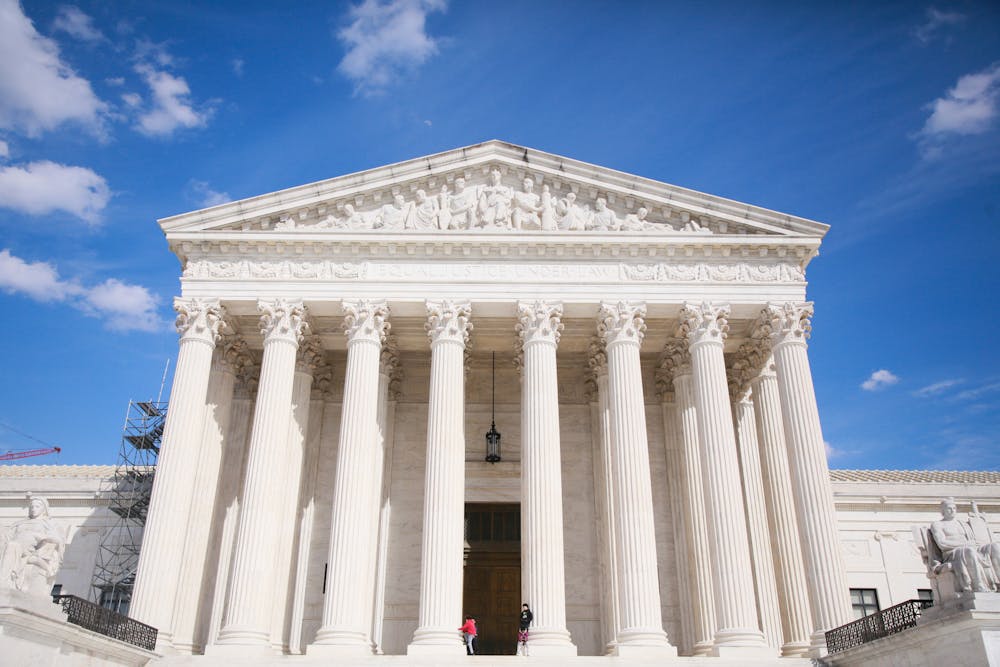
The U.S. Supreme Court is expected to reverse a lower court decision prohibiting 1968 Wharton graduate and former President Donald Trump from appearing on the Colorado primary ballot.
Credit: Jesse ZhangWASHINGTON — The United States Supreme Court appears poised to reverse a lower court decision prohibiting 1968 Wharton graduate and former President Donald Trump from appearing on the Colorado primary ballot.
In a 4-3 decision issued on Dec. 19, 2023, the Colorado Supreme Court deemed Trump ineligible to appear on the state’s primary ballot due to his role in inciting an insurrection on the Capitol, and Maine followed suit shortly afterwards. The court heard oral arguments on Thursday about Trump's eligibility to hold presidential office, with many justices appearing skeptical of multiple aspects of Colorado’s decision.
The Colorado ruling hinged on whether the events of Jan. 6, 2021, constituted an insurrection, whether Trump was actively engaged in it, and the applicability of Section 3 of the United States Constitution's 14th Amendment — a Reconstruction Amendment adopted shortly following the Civil War — to the presidency. The Amendment states that no one who has engaged in insurrection or rebellion against the United States, having previously taken an oath to support the Constitution, is eligible to hold any office in the country.
Justices across the political spectrum expressed doubt on Thursday toward aspects of the Colorado Supreme Court’s decision, including newly appointed Justice Ketanji Brown Jackson and Justice Clarence Thomas — who resisted calls to recuse himself from the case despite his wife, Virginia "Ginni" Thomas, being a leader in the Jan. 6, 2021, Capitol riot.
While the argument featured minimal discussion of the Jan. 6, 2021, riot and whether it constituted an insurrection — which Trump's lawyers continued to deny — the justices indicated a belief that the disqualification powers held in the 14th Amendment are allocated to Congress rather than individual states.
“I didn't see any evidence that the presidency was top of mind for the framers when they were drafting Section 3 [of the 14th Amendment],” Jackson said during the oral argument.
Chief Justice John Roberts said that the 14th Amendment was put in place to restrict state power. He added that giving states the power to remove candidates from the ballot was “at war with the whole thrust of the 14th Amendment.”
In contrast, Justice Sonia Sotomayor — who was originally nominated by President Barack Obama — stated that “there's a whole lot of examples of states relying on Section 3 to disqualify insurrectionists for state offices.”
Several justices also expressed concerns that allowing states to disqualify candidates for the presidency could lead to more chaos and harm to the United States’ democracy.
In particular, Roberts and Justice Samuel Alito repeatedly suggested that other states could respond to Trump’s removal by removing a Democratic candidate from ballots, positing that they had engaged in insurrection.
Various justices appeared to be amenable to other arguments made by Trump’s counsel, including that Section 3 prohibits candidates from holding office but not running for office. His counsel also argued that the president is not "an officer of the United States" and therefore not subject to Section 3 of the 14th Amendment, the rationale held by Colorado's lower court before being overturned by the Colorado Supreme Court.
“Even if the candidate is an admitted insurrectionist, Section 3 still allows the candidate to run for office and even win election to office and then see whether Congress lifts that disability after the election,” Jonathan Mitchell, one of Trump’s attorneys, said.
On Dec. 29, Maine Secretary of State Shenna Bellows became the first secretary of state to unilaterally disqualify Trump from the ballot. Under Maine state law, voters must challenge a candidate’s qualifications via petition to the secretary of state. Bellows received three challenges to Trump’s nomination, two of which argued that the insurrection deemed him ineligible to hold public office under the 14th Amendment.
On Jan. 2, Trump appealed the ruling from Bellows and demanded that she place him on the March 5 primary ballot, asserting that she abused her discretion and utilized “untrustworthy evidence.”
Lawsuits challenging Trump’s eligibility have been raised in at least 31 states, at least 20 of which have failed for varying reasons. A case in Pennsylvania was voluntarily dismissed by the plaintiffs.
“Pennsylvania's Election Code does not give me, as Secretary of the Commonwealth, the authority to reject a nomination petition,” Pennsylvania Secretary of State Al Schmidt said. ”In Pennsylvania, that is a question that can be answered only by the courts.”
In September 2023, The Daily Pennsylvanian reported that an article written by two conservative law professors in the Penn Law Review concluded that Trump was constitutionally ineligible to serve as president for a second term.
The Daily Pennsylvanian is an independent, student-run newspaper. Please consider making a donation to support the coverage that shapes the University. Your generosity ensures a future of strong journalism at Penn.
Donate



